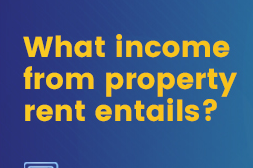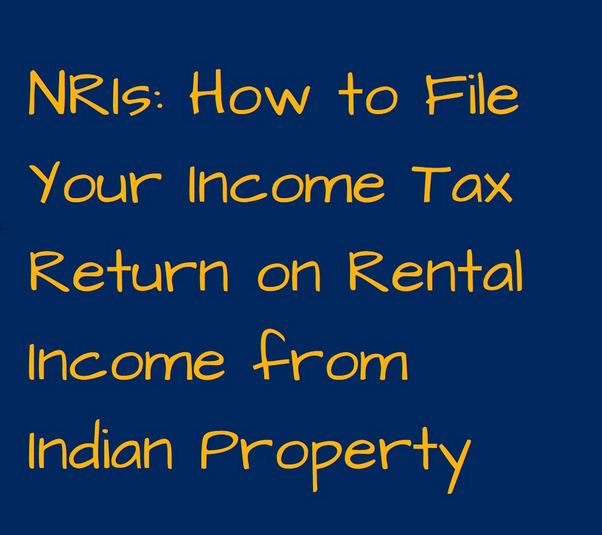
Rental income is generated by leasing out a property and is subject to taxation as per the provisions of the Income Tax Act, 1961. The taxable income from a property is determined based on its annual value, which is essentially its rental yield and property owners are obligated to pay taxes on this income. Read on to know the process of calculating income tax on rental income.
Income from House Property: Tax on rental income

Income from House Property: Tax on rental income
For the purpose of tax computation, the Income Tax Act has divided the income received by an individual into five different heads.
Income from Salary
Income from House Property
Income from Profits and Gains of Business or Profession
Income from Capital Gains
Income from Other SourcesAny amount received from renting a residential property, a shop, a building, or a factory building is taxable. The rental income tax is determined after deducting municipal taxes, standard deduction, and interest paid towards any home loan availed. As per Section 24A of the Income Tax Act, a taxpayer is entitled to a 30 percent standard deduction from the rental income to cover expenses like renovation/repairs. The individual earning rental income must be the legal owner of the property to avail of the deductions permissible under the Income Tax.
How is income tax on rental income calculated?

The tax on rental income in India can be calculated through the process highlighted below:
Calculate the Gross Annual Value (GAV) of the rented property. Gross annual value is the annual rent received from the tenant.
Subtract the amount of Property Tax paid from the Gross Annual Value to arrive at the Net Annual Value (NAV). Property Tax or House Tax is a municipal tax paid once a year to the respective municipal authority.
From the Net Annual Value (NAV), deduct 30 percent of the NAV, which is a standard deduction permissible under Section 24A of the Income Tax Act.
If the owner has availed a housing loan of a rented property, then the entire amount of interest paid on the housing loan during the financial year is allowed to be deducted from the rental income after allowing for the standard deduction. This rebate is permissible under Section 24B of the Income Tax Act.
The remaining amount is the taxable rental income of an individual on which income tax shall be paid as per the corresponding tax slab.For example, if the monthly rent of an apartment is Rs. 25,000, then:
Gross Annual Value (GAV)= 12 (months) x 25000 = Rs. 3,00,000/-
Property tax paid: Rs 20,000
Net Annual Value= Rs 3,00,000- Rs 20,000 = Rs 2,80,000
Standard deduction: 30% of NAV= 84,000
Interest paid on home loan: Rs 80,000
Taxable Income: 2,80,000-84,000-80,000= Rs 1,16,000
Here, if the GAV would have been less than Rs 2.5 lakh, there would have been zero tax on rental income.
What is Income from House Property?

Income from House Property includes rent received from the following sources:
Rental income from house propertyRental income from a property, whether an apartment, a building, or land of which the taxpayer is the owner, is taxed under the head ‘Income from House Property’.
Rental income from a shopRental income from a property, a shop being a building or land, of which the taxpayer is the owner, is taxed under the head Income from House Property.
Rental income from composite rentIn cases where letting out of the building and letting out of other assets are separable, for example, letting out of washing machine and other gadgets along with the house, the rent received for the house will be taxed under the ‘Income from House Property’ and rent of other assets will be taxed under Income from Other Sources or Profits and Gains of Business and Profession.
Rental income from a house property in which a part is self-occupied and the remaining parts are let-outIn this case, all the parts of the property will be treated as independent units, and income from those units will be taxed under separate heads:
The income from the unit occupied by the owner will be taxed under self-occupied property income.
And, the income from the unit let-out by the owner will be taxed under Income from House Property.
Rental Income which is not taxed under Income from House Property include;
The rental income received by a tenant from sub-letting a property cannot be taxed under the head Income from House Property.
If the letting out of the building and letting out of other assets are inseparable, such as letting of equipped theatre, then entire rent will be taxed under the Income from Other Sources or under Profits and Gains of Business.Under which section is income from house property taxed?

As per the Indian Tax Laws, Income from House Property shall be charged under Section 22.
The charging section reads as follows: “The annual value of property consisting of any buildings or lands appurtenant thereto of which the assessee is the owner, other than such portions of such property as he may occupy for the purposes of any business or profession carried on by him, the profits of which are chargeable to income-tax shall be chargeable to income-tax under the head Income from House Property.”
According to section 22, the following are the conditions to be satisfied to tax any income under the head Income from House Property:
a) There should be a property consisting of a building or land appurtenant thereto.
b) The property should be owned by the assessee.
c) The property should not be used by the owner of the property for the purpose of his business or profession, the profit of which is chargeable to income-tax.
How much rental income is taxable?

- The total amount that an owner receives as rent in a year is called the Gross Annual Value. The entire Gross Annual Value is not taxed; the owner is allowed deductions.
- The owner can deduct the amount of property tax paid that year from the Gross Annual Value; this deducted value is called Net Annual Value (NAV).
- From this Net Annual Value, deduct 30 percent of NAV; this is a standard deduction for any expenditure for repair or renovations, a rebate under Section 24 A of the Income Tax Act.
- If a housing loan has been availed to purchase the property which is rented out, then the total interest paid in a year is allowed to be deducted from Net Annual Value under Section 24 B under the Income Tax Act.
- The remaining amount is the taxable income of the individual. A person pays Income Tax on this remaining amount according to their respective tax slab.
How to Calculate the Gross Annual Value of the let-out property?
GAV should be calculated for both let-out property and deemed let-out property. Where the property is let out for the whole year, then the GAV would be higher of:
1. Expected Rent (ER): The expected rent is the higher of the fair rent and municipal value but is restricted to standard rent. It cannot exceed standard rent but can be lower than standard rent, but it can be more than fair rent and Municipal value.
For example, if Manoj owns a house that is let out, Determine the GAV, Muncipal value-Rs.80,000, Fair Rent –Rs.90,000, Standard Rent-Rs.75,000, Actual Rent-Rs.72,000.
Tax for NRI on rental income

Rental income earned by NRIs and Indian citizens is taxable. So, if you are an NRI earning rental income by renting out your property in India, you are liable to pay tax on the rental income under Section 24. However, for NRI properties, it is the tenant who makes the tax payment on the property. The tenant deducts 31.2 percent tax at the source (TDS) and make the payment to the NRI’s account.
The tenant then will submit the TDS form to the respective authority and file Form 15CA with the Income Tax Department. The NRI is liable to pay double tax – one in India as per Section 24 and the other in the country where the NRI is residing for the same property. Thus, to avoid double taxation, it is crucial for an NRI to check whether there is a Double Taxation Avoidance Agreement (DTAA) between India and the other country where he/she resides.
So, if you plan to rent your property to earn a secure and passive rental income, it is important to understand the intricacies of the entire process. With a clear understanding of the rules and regulations, a property owner can avoid paying tax on rental income.